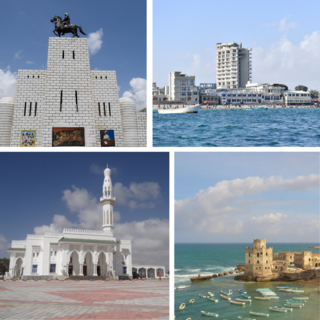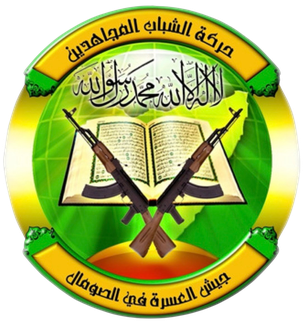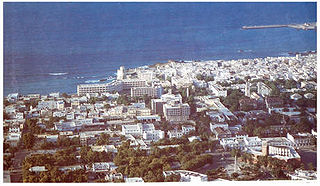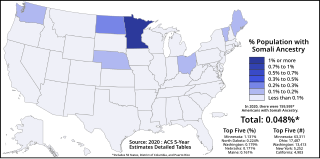
Mogadishu, locally known as Xamar or Hamar, is the capital and most populous city of Somalia. The city has served as an important port connecting traders across the Indian Ocean for millennia and has an estimated urban population of 2,610,483.

Fazul Abdullah Mohammed was a Comorian-Kenyan member of al-Qaeda, and the leader of its presence in East Africa. Mohammed was born in Moroni, Comoros Islands and had Kenyan as well as Comorian citizenship. He spoke French, Swahili, Arabic, English, and Comorian.

Abdullahi Yusuf Ahmed was a Somali politician and former colonel in the Somali National Army. He was one of the founders of the Somali Salvation Democratic Front, as well as the Puntland state of Somalia, the latter of which he served as the first president. In 2004, Ahmed also helped establish the Transitional Federal Government, which he led as President of Somalia from 2004 until 2008.

The Somali Civil War is an ongoing civil war that is taking place in Somalia. It grew out of resistance to the military junta which was led by Siad Barre during the 1980s. From 1988 to 1990, the Somali Armed Forces began engaging in combat against various armed rebel groups, including the Somali Salvation Democratic Front in the northeast, the Somali National Movement in the northwest, and the United Somali Congress in the south. The clan-based armed opposition groups overthrew the Barre government in 1991.

The Transitional Federal Government (TFG) was internationally recognized as a provisional government of the Republic of Somalia from 14 October 2004 until 20 August 2012, when its tenure officially ended and the Federal Government of Somalia was inaugurated.

The Ethiopian occupation of Somalia, also called the Ethiopian invasion of Somalia or the Ethiopian intervention in the Somali Civil War, was an armed conflict that lasted from late 2006 to early 2009. It began when military forces from Ethiopia, supported by the United States, invaded Somalia to depose the Islamic Courts Union (ICU) and install the Transitional Federal Government (TFG). The conflict continued after the invasion when an anti-Ethiopian insurgency emerged and rapidly escalated. During 2007 and 2008, the insurgency recaptured the majority of territory lost by the ICU. At the start of 2009 Ethiopian troops withdrew from Somalia, but became re-involved several years later to counter the growing strength of Al-Shabaab.

The African Union Mission in Somalia (AMISOM) was a regional peacekeeping mission operated by the African Union with the approval of the United Nations Security Council. It was mandated to support transitional governmental structures, implement a national security plan, train the Somali security forces, and to assist in creating a secure environment for the delivery of humanitarian aid. As part of its duties, AMISOM supported the Federal Government of Somalia's forces in their battle against Al-Shabaab militants.
Various international and local diplomatic and humanitarian efforts in the Somali Civil War have been in effect since the conflict first began in the early 1990s. The latter include diplomatic initiatives put together by the African Union, the Arab League and the European Union, as well as humanitarian efforts led by the Office for the Coordination of Humanitarian Affairs (OCHA), UNICEF, the World Food Programme (WFP), the Puntland Maritime Police Force (PMPF) and the Somali Red Crescent Society (SRCS).

Harakat al-Shabaab al-Mujahideen, commonly known as al-Shabaab, is a Sunni Islamist military and political organization based in Somalia and active elsewhere in East Africa. It is actively involved in the ongoing Somali Civil War and incorporates elements of Somali nationalism into its Islamist cause. Allegiant to the militant pan-Islamist organization al-Qaeda since 2012, it has also been suspected of forging ties with al-Qaeda in the Islamic Maghreb, and al-Qaeda in the Arabian Peninsula.

The Somali diaspora or Qurbajoogta refers to Somalis who were born in Greater Somalia and reside in areas of the world that they were not born in. The civil war in Somalia greatly increased the size of the Somali diaspora, as many Somalis moved from Greater Somalia primarily to Europe, North America, Southern Africa and Australia. There are also small Somali populations in other pockets of Europe and Asia. The UN estimates that in 2015, approximately 2 million people from Somalia were living outside of the country's borders.

Mogadishu is the largest city in Somalia and the nation's capital. Located in the coastal Benadir region on the Indian Ocean, the city has served as an important port for centuries.

Somali Americans are Americans of Somali ancestry. The first ethnic Somalis to arrive in the U.S. were sailors who came in the 1920s from British Somaliland. They were followed by students pursuing higher studies in the 1960s and 1970s, by the late 1970s through the late 1980s and early 1990s more Somalis arrived. However, it was not until the mid and late 1990s when the civil war in Somalia broke out that the majority of Somalis arrived in the United States. The Somali community in the U.S. is now among the largest in the Somali diaspora.

The 2009 timeline of events in the Somalia War (2006–2009) during January 2009 is set out below. From the beginning of February the timeline of events in the Somali Civil War (2009–present) is set out following the conclusion of the previous phase of the civil war.

The Somali civil war (2009–present) is the ongoing phase of the Somali civil war which is concentrated in southern and central Somalia. It began in late January 2009 with the present conflict mainly between the forces of the Federal Government of Somalia assisted by African Union peacekeeping troops and al-Shabaab militants who pledged alliegence to al-Qaeda during 2012.

Somalia–Yemen relations are bilateral relations between Somalia and Yemen. Both members of the Arab League, the two countries formally established diplomatic ties on December 18, 1960.
Somalis in South Africa are residents of South Africa who are of Somali descent. The earliest communities were formed in Cape Town and surrounding areas in the late nineties and early 2000s. A number of Somali-South African residents have risen to prominence locally and internationally.

Pakistan–Somalia relations are the bilateral relations between Pakistan and Somalia. Both Organisation of Islamic Cooperation members, the two countries have historically maintained strong relations. Somalia also has an embassy in Islamabad.
Immigration in Somalia is regulated by the Somali Immigration Department of the Federal Government of Somalia.

Freedom of religion in Somalia refers to the extent to which people in Somalia are freely able to practice their religious beliefs, taking into account government policies, non-state actors, and societal attitudes toward religious groups. Due to the Somali Civil War, the enforcement of laws pertaining to religion by the various autonomous governments in the region is inconsistent.
On 18 January 2020, a suicide car bombing killed four and injured at least 20 others in Afgooye, approximately 30 kilometres (19 mi) from the Somali capital, Mogadishu. Most of the casualties were police officers protecting Turkish contractors building a road. The al-Qaeda-linked extremist group al-Shabaab claimed responsibility for the attack.















